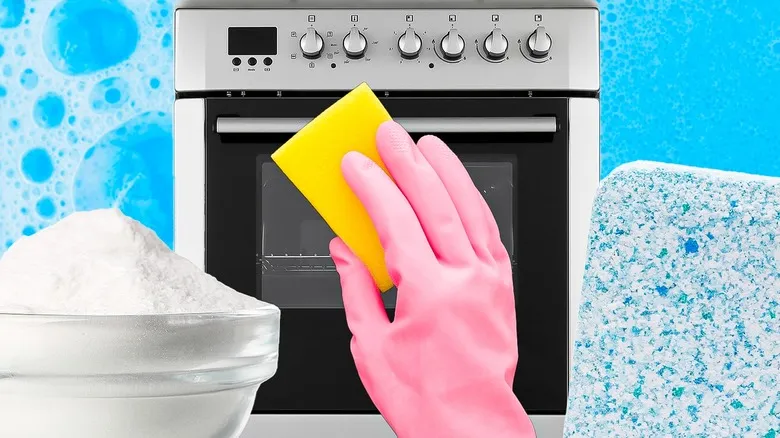Gently warm the oven before removing burned residue
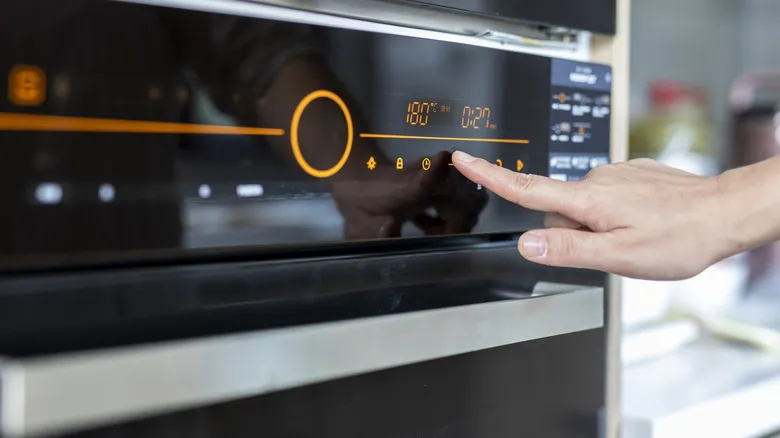
It's clear that you shouldn't reach into a hot oven to start cleaning while it's still heated or if it's warm from your previous cooking. However, as Toby Schulz points out, a little heat can help loosen stubborn residue, making it easier to clean. Therefore, he recommends not waiting for the oven to be completely cool before tackling spills and splatters. "For baked-on food and grease, [wait until] your oven has cooled to about 122 degrees Fahrenheit," he advises. "Put on some rubber gloves and use a cooktop scraper or razor blade to remove any food residue while it's still warm."
He also suggests gently warming up your oven if it has already cooled down. "If you're dealing with a cool oven (like one that's been off for a while), preheat it to 122 degrees Fahrenheit and then turn it off. Give it a moment before using the scraper," he explains. At this stage, the oven will be warm enough to soften baked-on residue (such as drippings from last night's macaroni and cheese) but cool enough to work in safely.
A dishwashing tablet can remove tough dirt
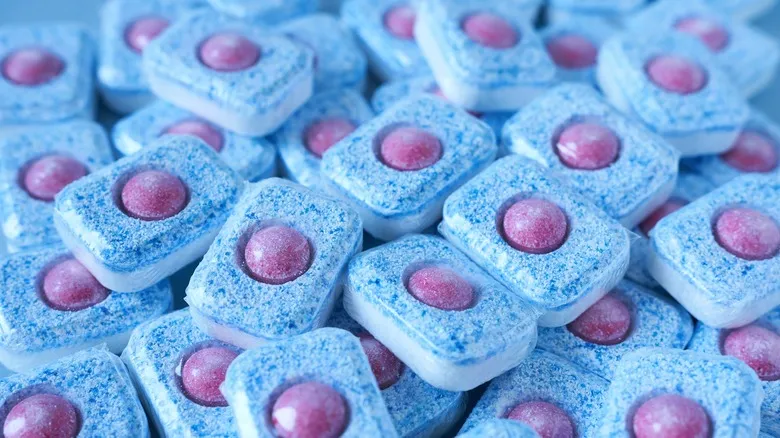
When it comes to cleaning our ovens, we’ve all faced those frustrating stains or charred bits that seem impossible to remove, no matter how vigorously we scrub. (And let’s be honest, we won’t stop indulging in our delicious, messy favorites to avoid this. Those salted caramel-stuffed white chocolate chip cookies are absolutely worth it, even if they occasionally leave a lasting mark on the oven floor.) Thankfully, resourceful cooks have discovered a clever solution. "There’s a trick that’s becoming quite popular — use a dishwasher tablet!" said Toby Schultz. "Just dampen it in warm water (but be careful not to let it crumble) and use it to gently scrub the surfaces of the oven."
This method might seem unusual, but it’s easy to understand why it’s effective. After all, dishwasher tablets are formulated to tackle the same kinds of grime — baked-on grease and food particles — as traditional oven cleaners. Plus, their gritty, abrasive texture can help dislodge stubborn residue. To clean your oven with a damp dishwasher tablet, simply rub it over any soiled areas, re-wetting the tablet as needed. Once you’ve finished, wipe away any soapy residue with a damp cloth. These tablets work wonders not just on the oven walls, but also on the glass window of your oven.
Don't overuse your self-cleaning function
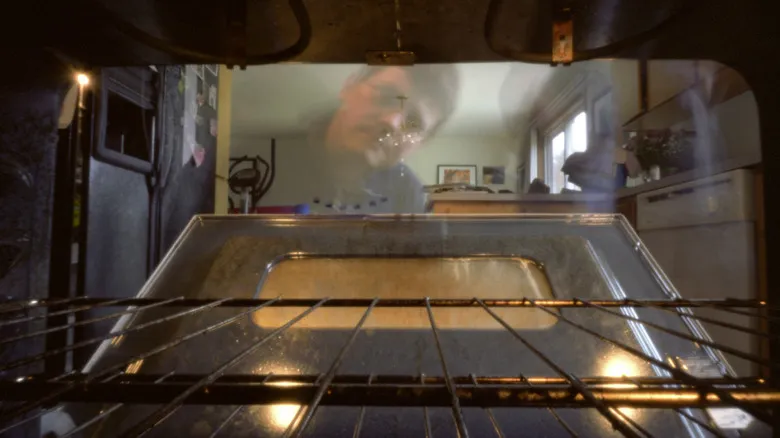
If your oven features a self-cleaning option, it can seem like a miracle — no scrubbing, no awkward positions, and no unpleasant chemical fumes. Simply remove the racks, close the oven door, activate the self-cleaning mode, and in a few hours, you'll have a spotless oven. However, while self-cleaning is incredibly convenient and generally effective at eliminating stubborn grime, experts caution that it’s not the cure-all that oven manufacturers suggest.
For starters, the self-cleaning process involves heating the oven to 800 degrees to burn away any residue, which can be tough on the appliance. "We never advise our clients to use the self-cleaning feature of their oven," said Delah Gomasi. "I've encountered too many ovens that have suffered damage due to malfunctions in the self-cleaning function, and repairing the oven after such an incident often costs as much as the oven itself." Toby Schulz echoes these concerns, stating, "If you decide to use the self-cleaning function, never leave it unattended for extended periods. It raises the oven temperature to extremely high levels, posing a significant fire risk. Frequent use of the self-cleaning feature can also harm the internal circuitry and components of the oven, reducing its lifespan and efficiency." Additionally, this intense heat produces a lot of smoke, so if you opt for self-cleaning, make sure to keep a window open or a fan running.
Cover your bottom rack to catch drips
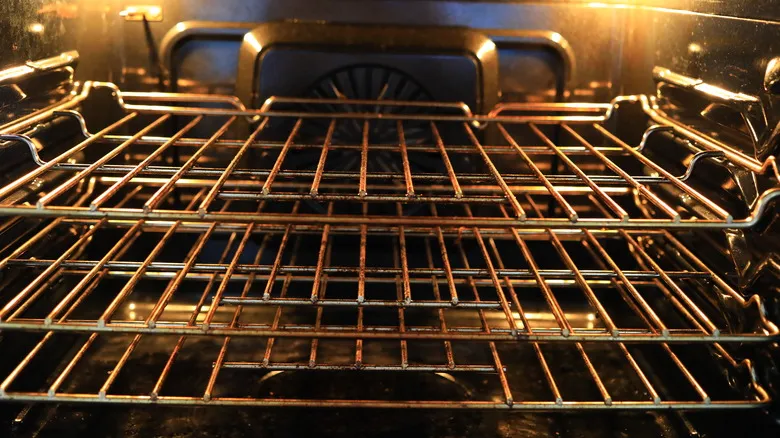
For enthusiastic home chefs, cleaning the oven can feel like a heavier chore compared to our non-cooking counterparts. Those who primarily use the microwave for their meals don’t have to fret about grease splatters from baking bacon or barbecue sauce spills. However, those who frequently bake or broil understand that messes in the oven are unavoidable, regardless of how careful we try to be. Cooks who take pride in their culinary creations recognize that a dirty oven can lead to unpleasant odors that affect the flavors of the dishes they prepare.
While spills and drips are part of the cooking process, there are ways to reduce their occurrence and impact. "Place baking sheets, aluminum foil, or oven liners on the lower rack to catch any drips and spills from your food," advises Toby Schulz. "This will help reduce food residue and grease accumulation in the oven." He cautions against placing foil directly on the oven floor, stating, "It should be on the lower rack, not the bottom of the oven. Using foil at the bottom can obstruct vents and heating, and the foil itself may become scorched."
Use a razor to scrape off burnt-on gunk
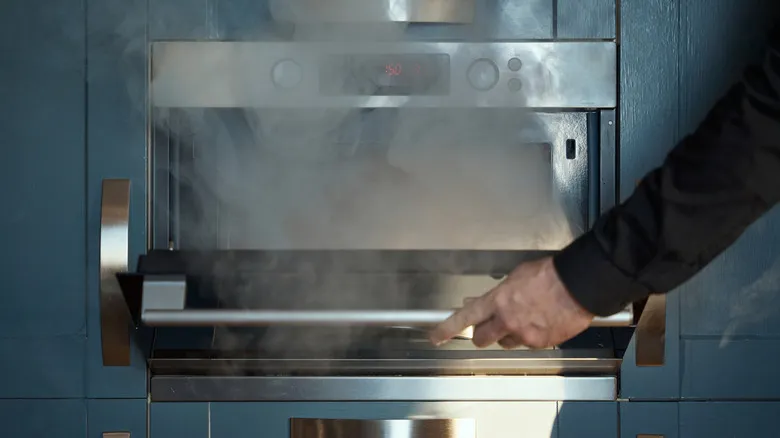
It's well-known that oven grime can be incredibly stubborn. You often find yourself facing stains or residue that no amount of damp cloths can eliminate. To tackle these challenges, you'll need more effective tools. As Toby Schulz suggests, a great first step is to start cleaning when the oven is slightly warm. The heat will help soften the tough gunk, making it easier to remove. He also recommends using the appropriate tools for the job. "A cooktop scraper or razor blade can effectively remove food residue while it's still warm," he noted.
However, be cautious with hard tools like these, as they can potentially damage your oven. It's wise to have gentler alternatives available for cleaning up any loose residue. "A nylon oven cleaning brush is a great tool for deep cleaning your oven," Stanley Chen mentioned. "Its flexible bristles are perfect for getting into crevices and scrubbing away residue without scratching the oven's surface."
Weekly steam cleaning can keep dirt from building up
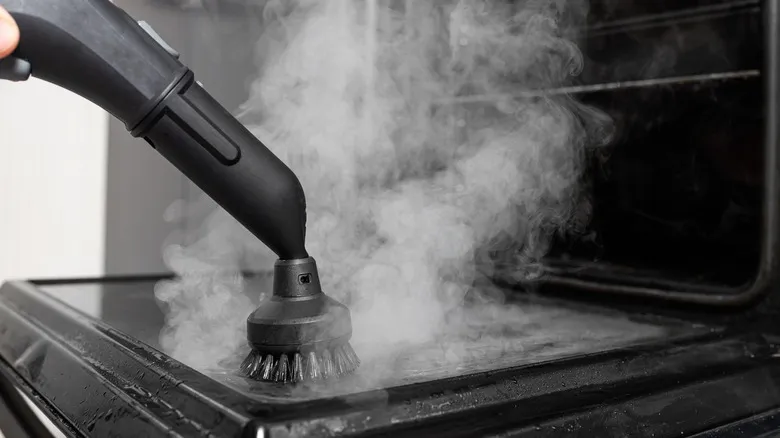
Cleaning the oven is a task that many of us dread. However, the harsh truth is that it’s necessary unless we’re willing to bake a boxed cake that smells like last week’s burnt salmon. Experts offer another undeniable fact: the best way to simplify this chore is to tackle it more frequently. "To maintain your oven in excellent condition with regular use, create a habit of cleaning it every month," advises Stanley Chen. "This consistent maintenance stops grease and food particles from becoming tough and time-consuming to remove."
To keep grime and grease at bay between cleanings, Toby Schulz suggests weekly steam cleanings. "You can steam clean your oven after each use (or weekly) by placing 4-8 cups of water mixed with half a cup of vinegar in an oven-safe container (preferably not glass)," he explains. "Preheat your oven to 250 degrees Fahrenheit, place the container on the lower rack, and close the door. The steam will help loosen surface dirt and grease." Additionally, some ovens are equipped with a steam cleaning feature. While this isn’t a replacement for a deep clean, it can help dislodge residue before it becomes firmly entrenched.
Wear PPE when working with oven cleaning sprays
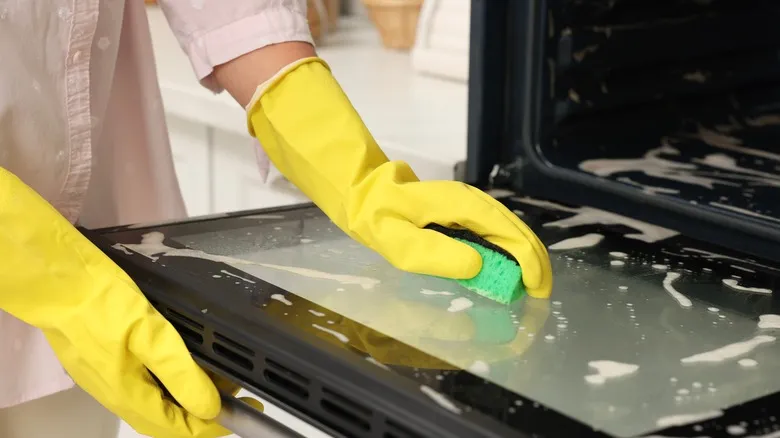
Spray-on cleaners may have their critics, but many of us still rely on them because they are effective. Even professionals endorse their use. "Spray-on oven cleaners, like Easy-Off, are both powerful and safe when applied properly, and our team at BerryClean stands by it," said Stanley Chen. "It effortlessly tackles tough grease and grime, helping to restore your oven to its pristine condition." However, with their strength comes a need for caution. These sprays, potent enough to break down burnt-on grease and food, can also harm your skin. Therefore, it's essential to apply them inside your oven without getting any on yourself.
Experts advise exercising caution when using these products. "To ensure safety, always adhere to the manufacturer's guidelines, wear protective gloves, and maintain good ventilation while cleaning," Chen advised. Delah Gomesi takes these precautions even further. "We always make sure our cleaners are equipped with the proper personal protective equipment (PPE) when using spray-on oven cleaners," he stated. "This includes protective goggles, gloves, and long sleeves to prevent any corrosive substances from contacting their skin." Additionally, be mindful that these cleaners can damage other surfaces in your kitchen. "We also use drop sheets to protect kitchen floors, ensuring that the spray-on cleaner doesn't touch sensitive surfaces like wooden floors or natural stone countertops," Gomesi added.
Baking soda is an odor-free alternative to oven cleaner
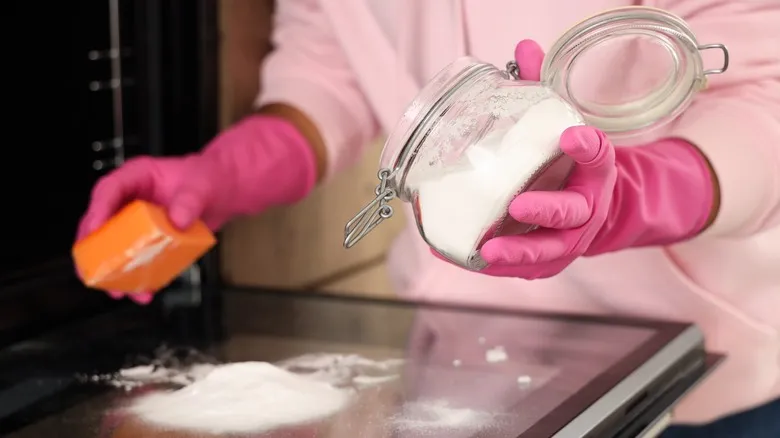
As previously noted, spray-on oven cleaners are favored for good reason; they are easy to use and effective. "In terms of performance, I believe spray-on oven cleaner offers the best value for your money," said Delah Gomasi. "It's efficient, user-friendly, and most spray-on oven cleaners let you apply the product, wait about 20 minutes, and then easily wipe away even the dirtiest ovens."
However, a drawback is that these cleaners can have strong odors and may be harmful if inhaled or ingested, which can be a concern for those sensitive to smells or uneasy about having harsh chemicals in their homes. "A safer and effective alternative to spray-on oven cleaners is a mixture of baking soda and vinegar," suggested Ronnie Kendrick. "Combine 1/2 cup of baking soda with a few tablespoons of water to create a thick paste. Wearing gloves, apply the paste inside the oven and let it sit for 12 hours or overnight. Afterward, wipe it down with a damp sponge. Spray white vinegar inside to react with any remaining baking soda, allow it to foam, and then wipe it clean. If necessary, repeat with vinegar to eliminate all residue. It's a powerful, non-toxic method to achieve a sparkling clean oven!"
Dawn Powerwash is another fume-free alternative
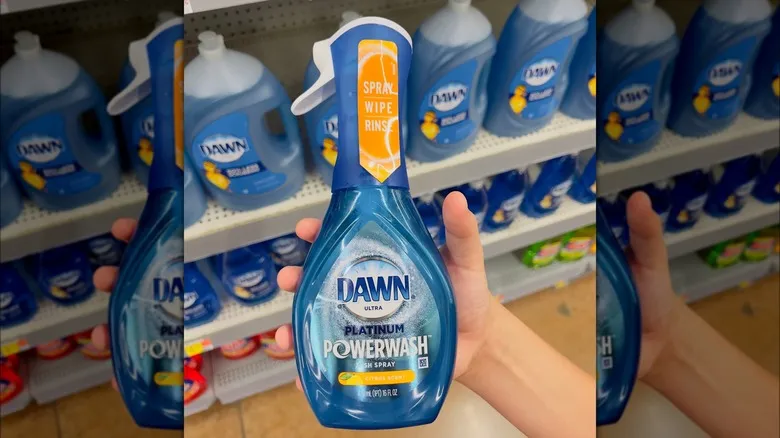
If you'd rather steer clear of spray-on oven cleaners but still seek something more potent than baking soda, there are several fume-free options available in stores. "Consider using cleaning pastes or gel and cream formulas, which can be applied with a damp sponge or cloth," advised Toby Schulz. "While they may require a bit more effort to tackle oven grease, there's no need for spraying. You can also find powder-based cleaners that usually need water or a damp cloth to activate, allowing you to scrub your oven clean."
Additionally, you can utilize cleaners that aren't specifically formulated for ovens but can still effectively do the job. "Many homeowners swear by Dawn Powerwash," Schulz noted. "This powerful cleaning spray can quickly clean your oven without the need for scrubbing. Just spray it on and wipe it off." He also recommends other products from the cleaning aisle. "Certain cleaning sponges (or magic erasers) are great for spot-cleaning or removing grime from oven doors," he added.
Use flexible brushes or pipe cleaners on tough-to-reach areas
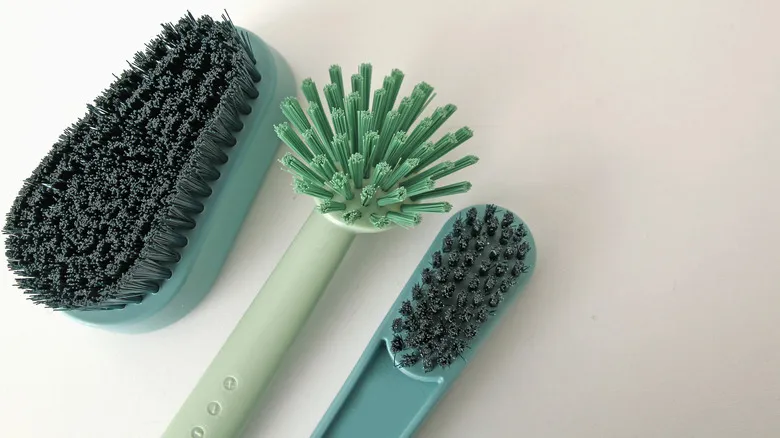
One of the many frustrating aspects of cleaning an oven is dealing with the numerous hard-to-reach areas, such as the back corners, the top of the oven, and the spaces around and beneath the heating elements. While it's easy to spray cleaner on the more accessible surfaces, wipe them down, and consider the task complete, these tricky spots demand significantly more effort and attention. Complicating matters is the need to keep cleaning solutions away from sensitive components. "Be careful not to get any cleaner (whether spray or otherwise) on the pilot light or heating elements," advised Toby Schulz. "These parts are delicate, and damaging them could lead to expensive repairs or an oven that doesn't function properly."
To tackle this issue, Schulz suggests using gel or paste cleaners that adhere better to the oven's surface and other difficult areas without dripping. He also recommends using brushes designed to fit into tight spaces. "Flexible brushes, like pipe cleaners, can help you remove dirt from hard-to-reach spots, such as the base of the oven door," he noted.
Recommended
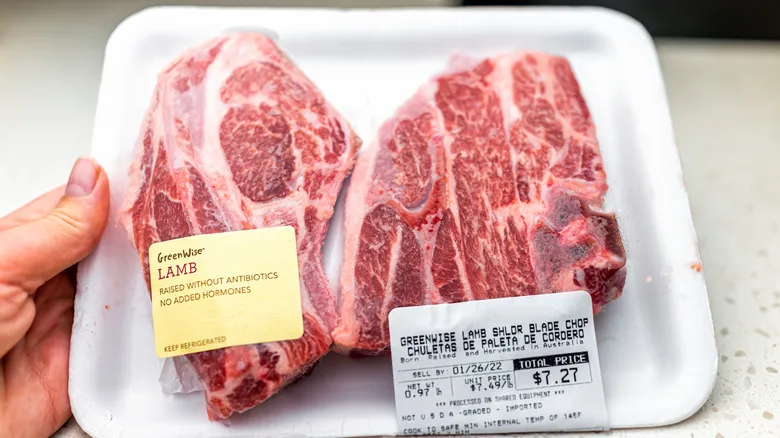
What Does It Mean When Meat And Poultry Have A 'No Antibiotics' Labels?
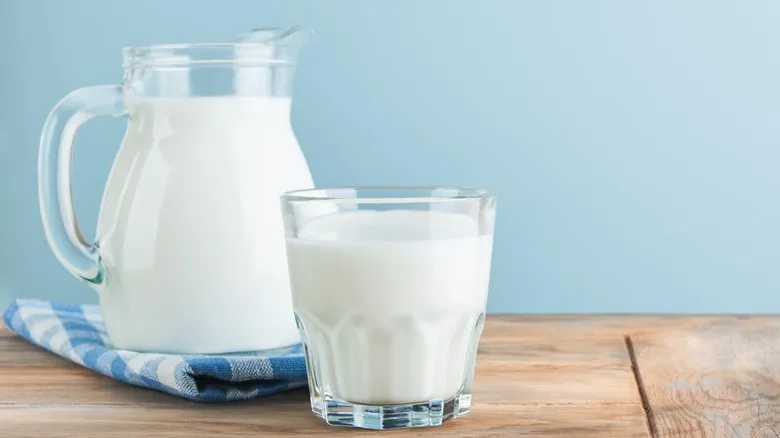
Is There Water In Whole Milk?

What Is Hazmat Whiskey, And Why Would You Even Want It?

Is It Safe To Make Popcorn In The Oven?
Next up

